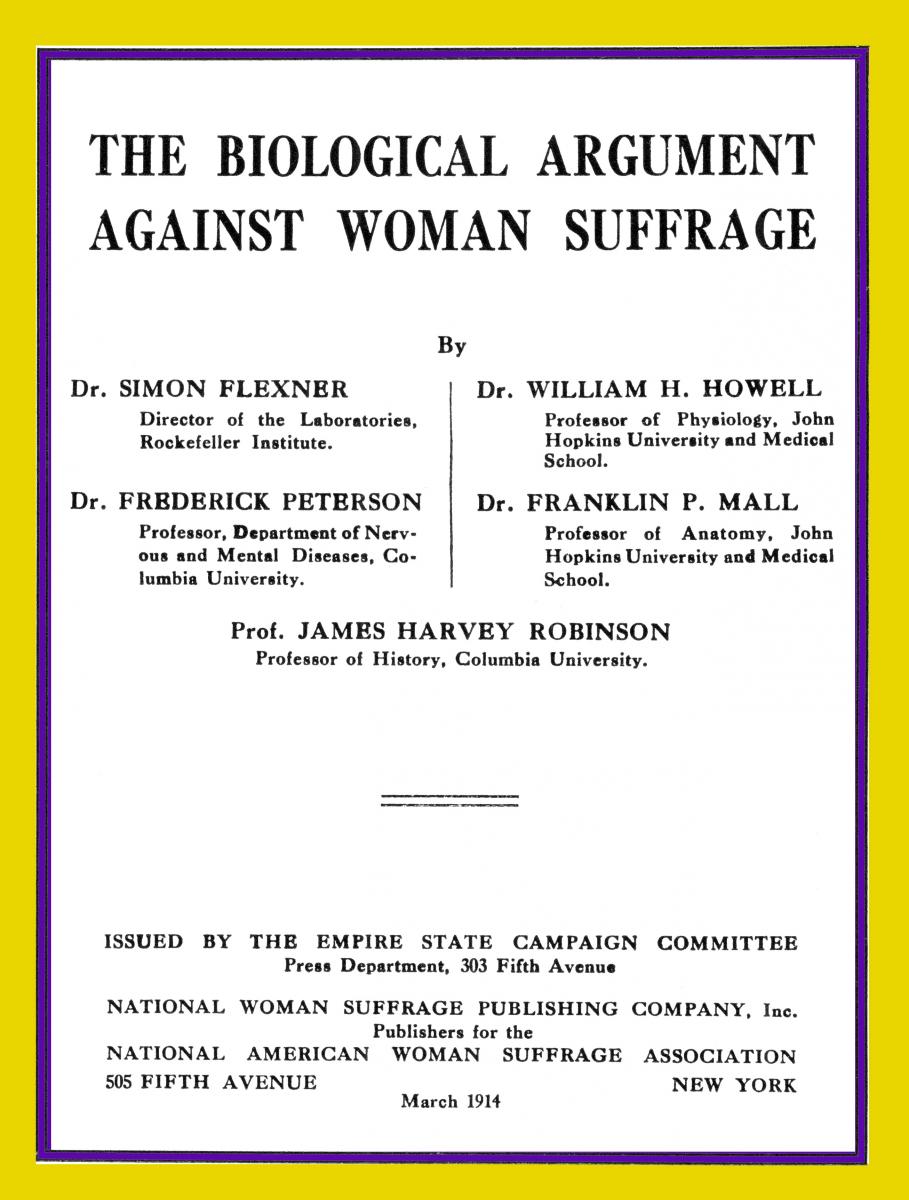
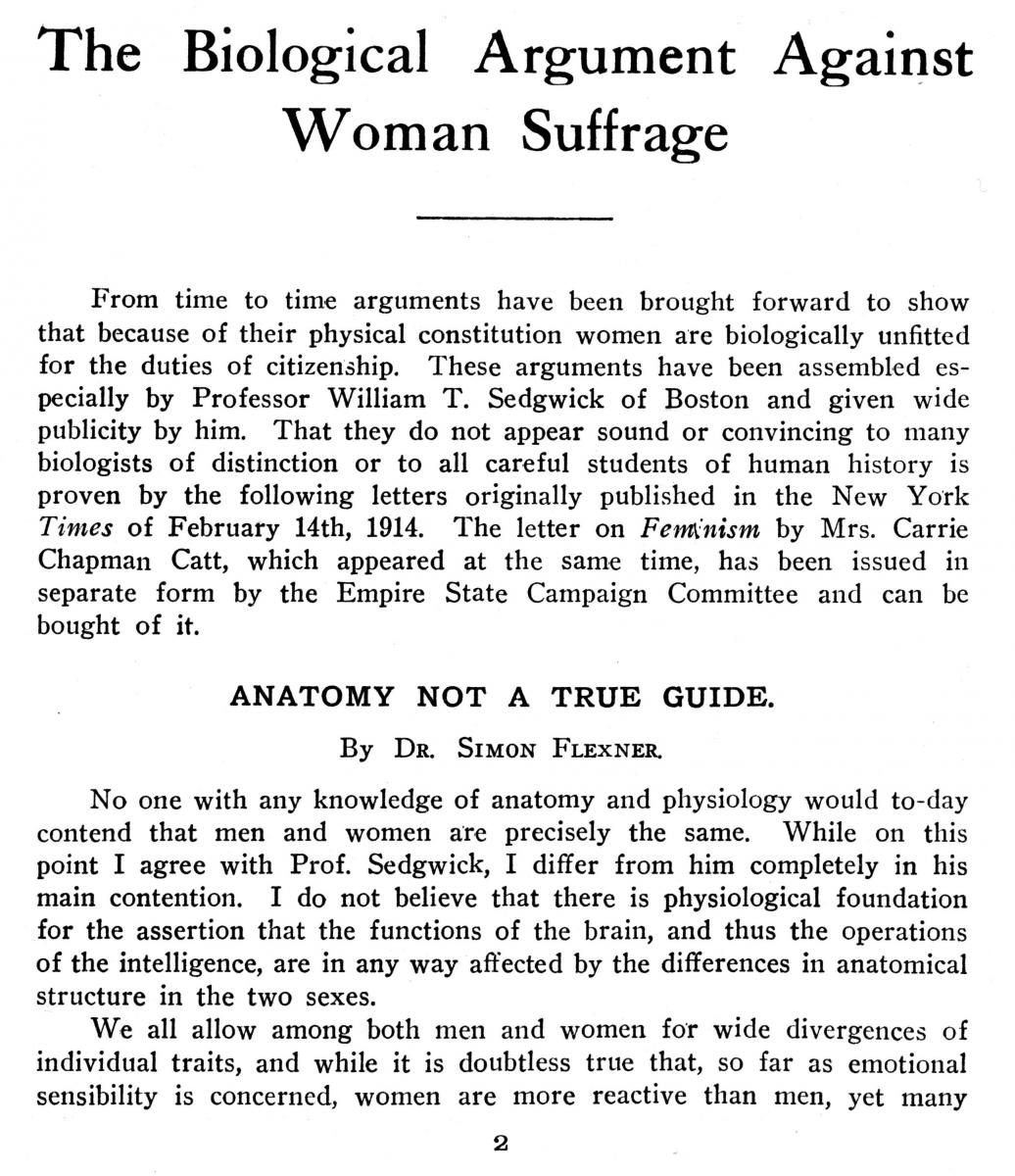
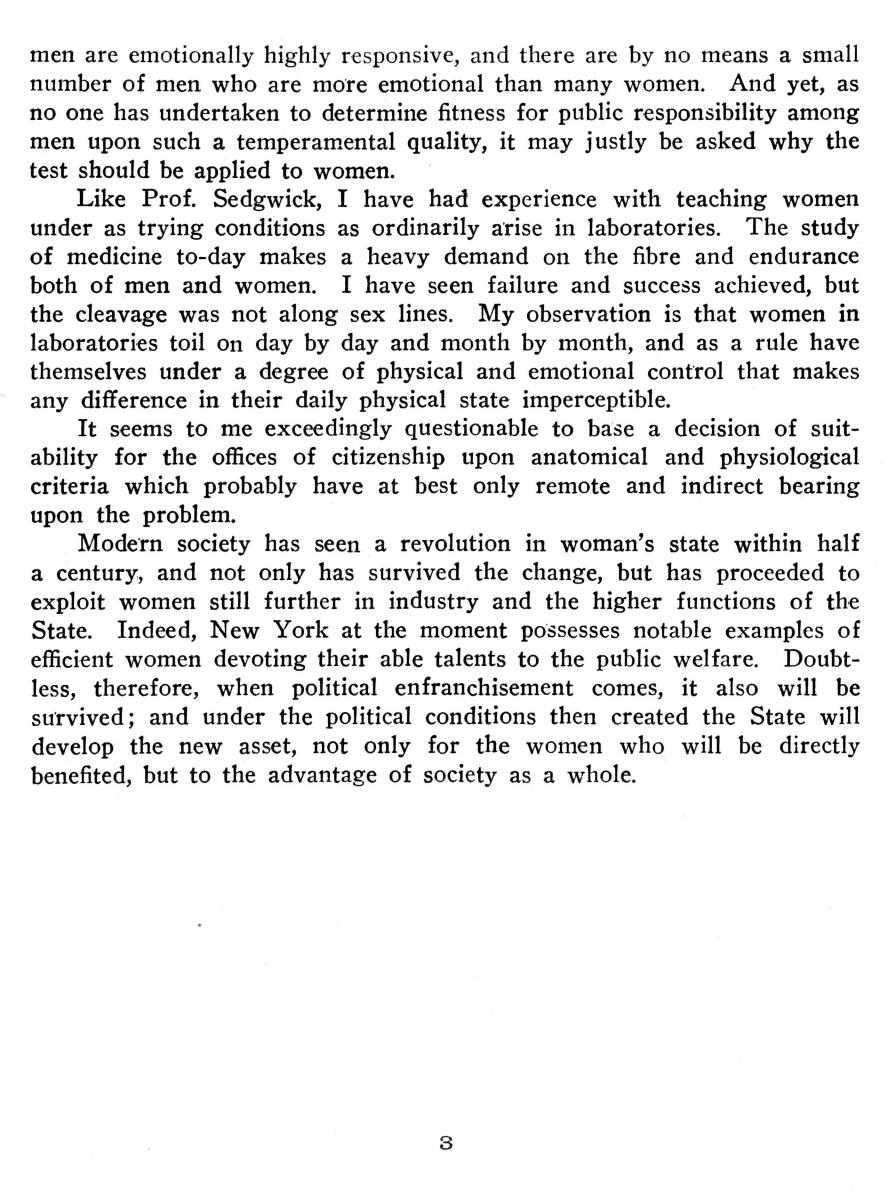
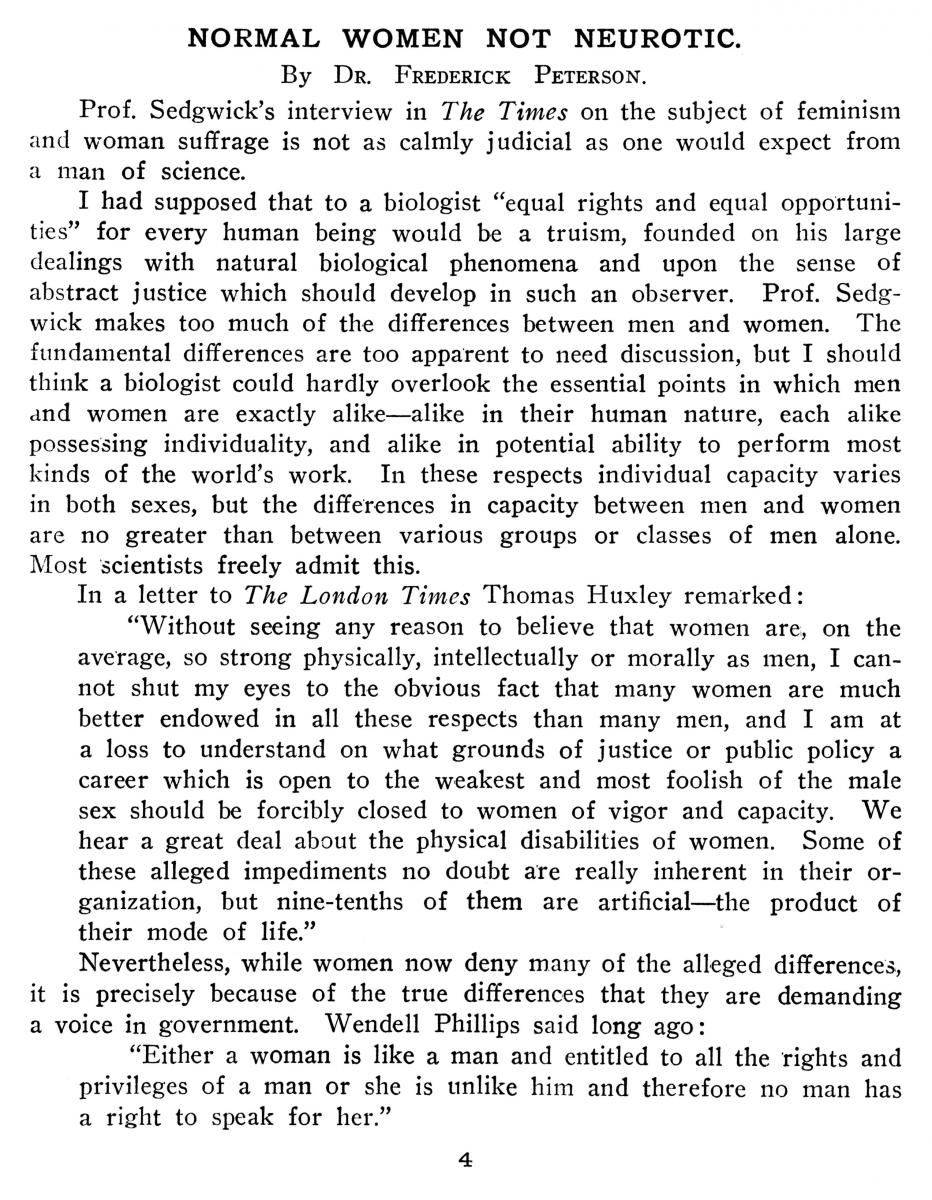
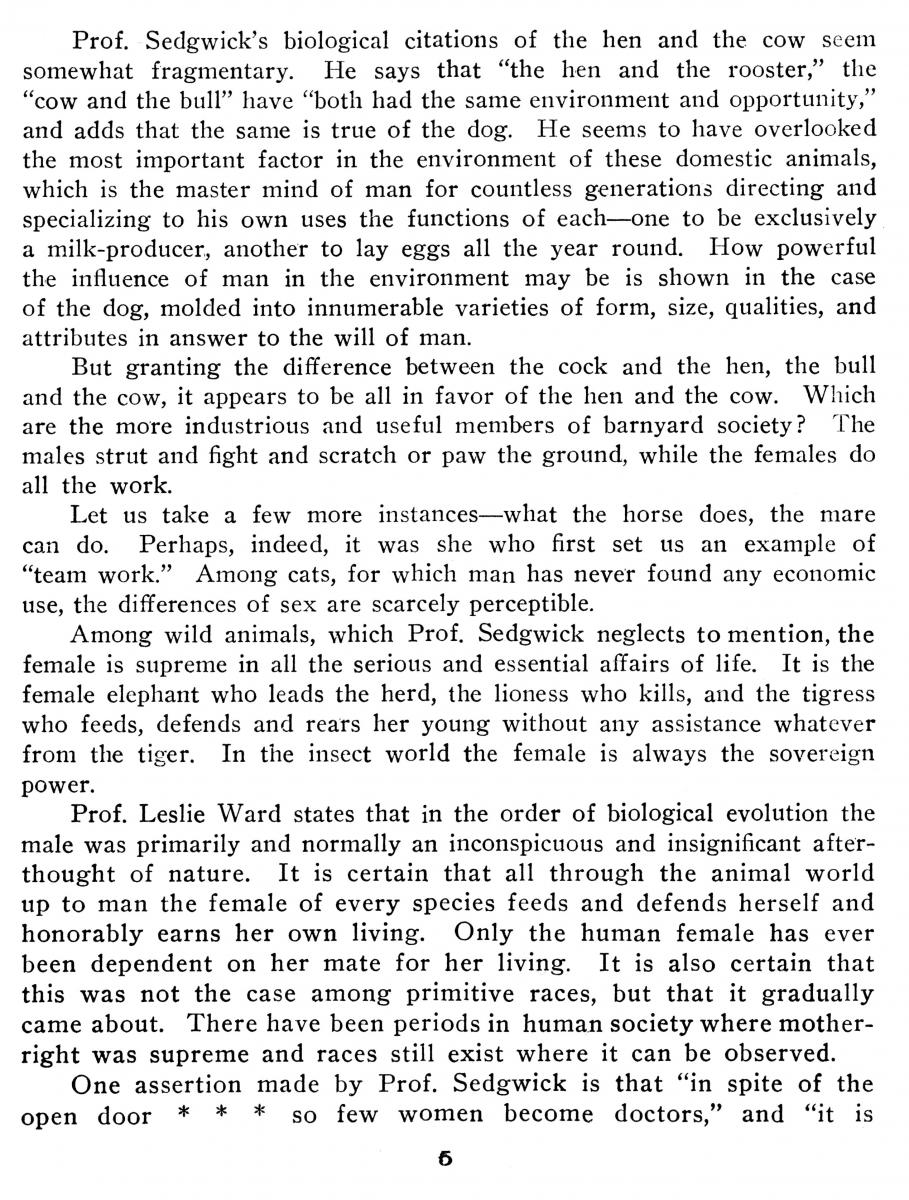
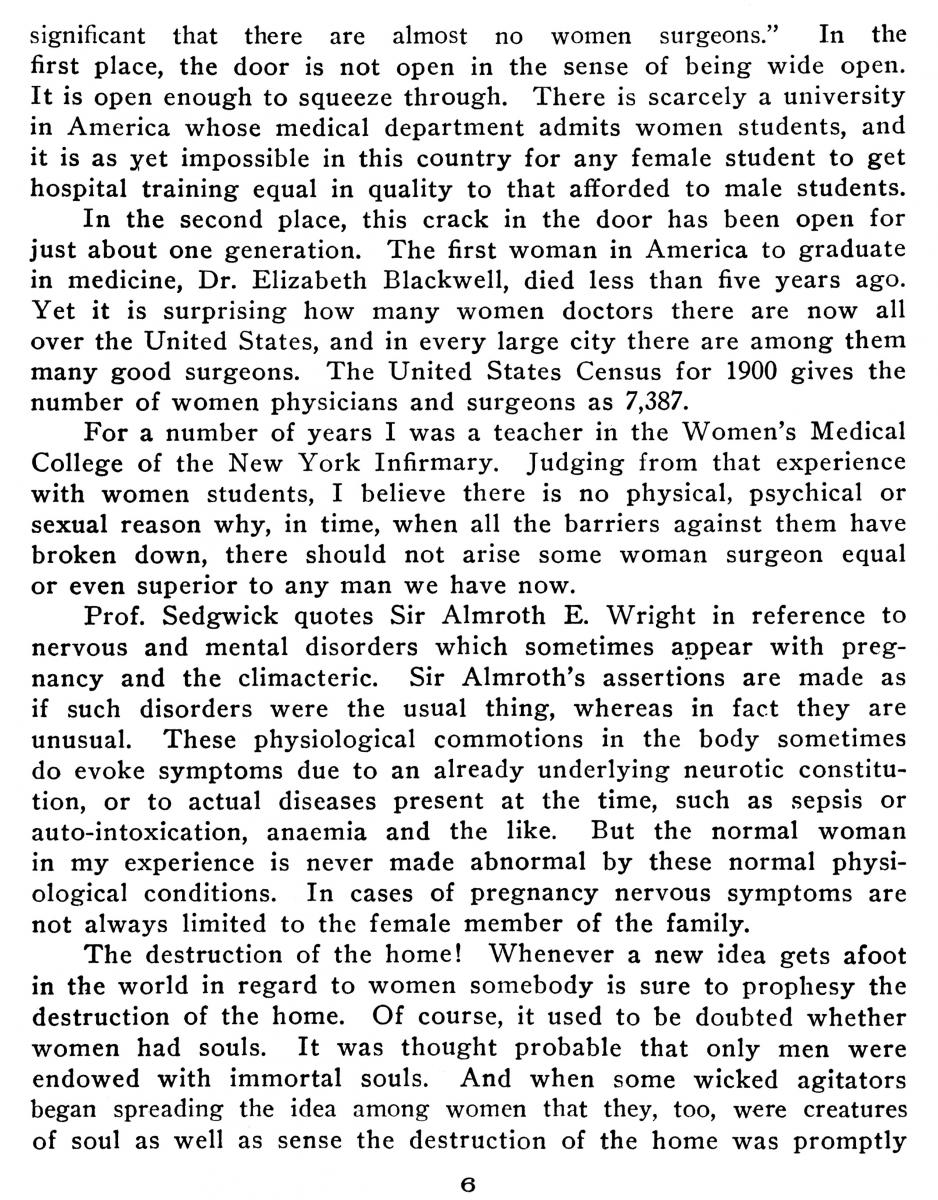
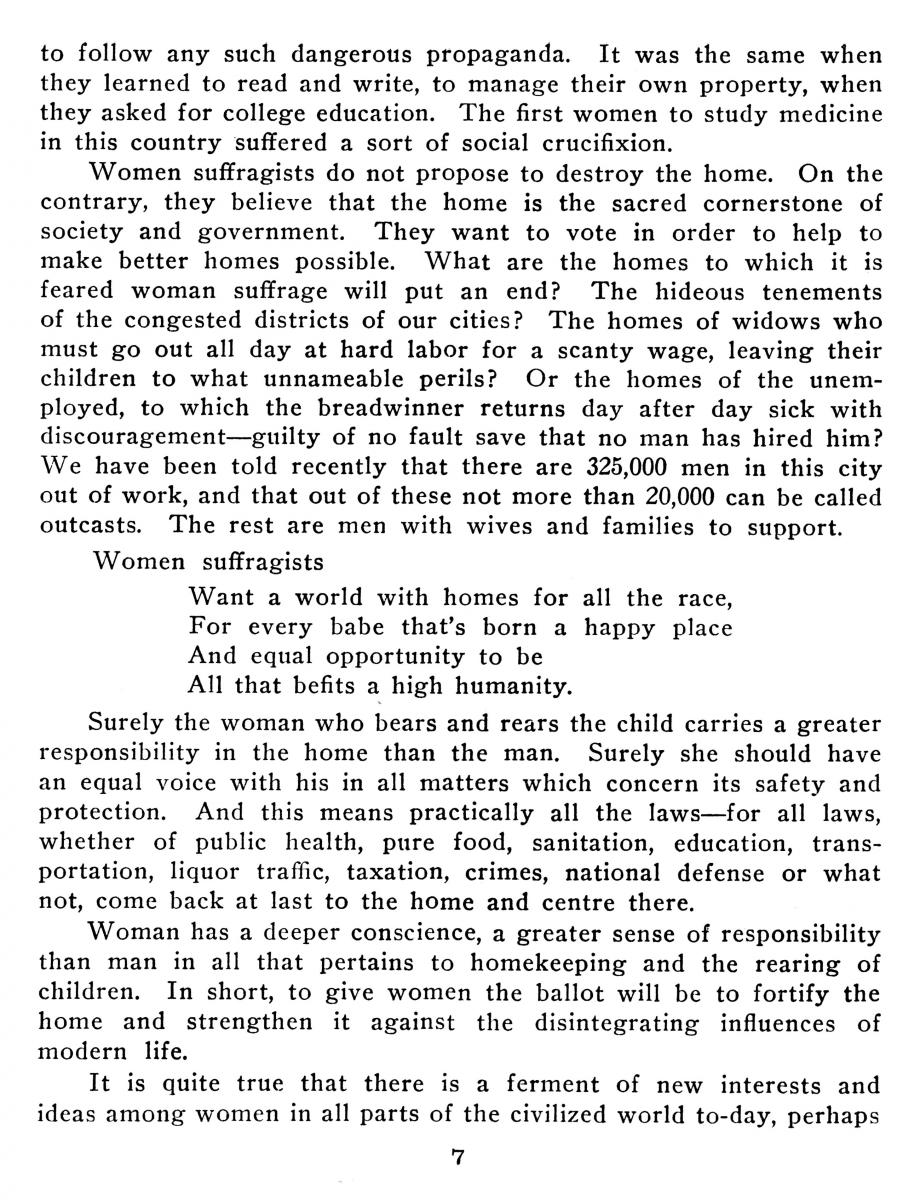
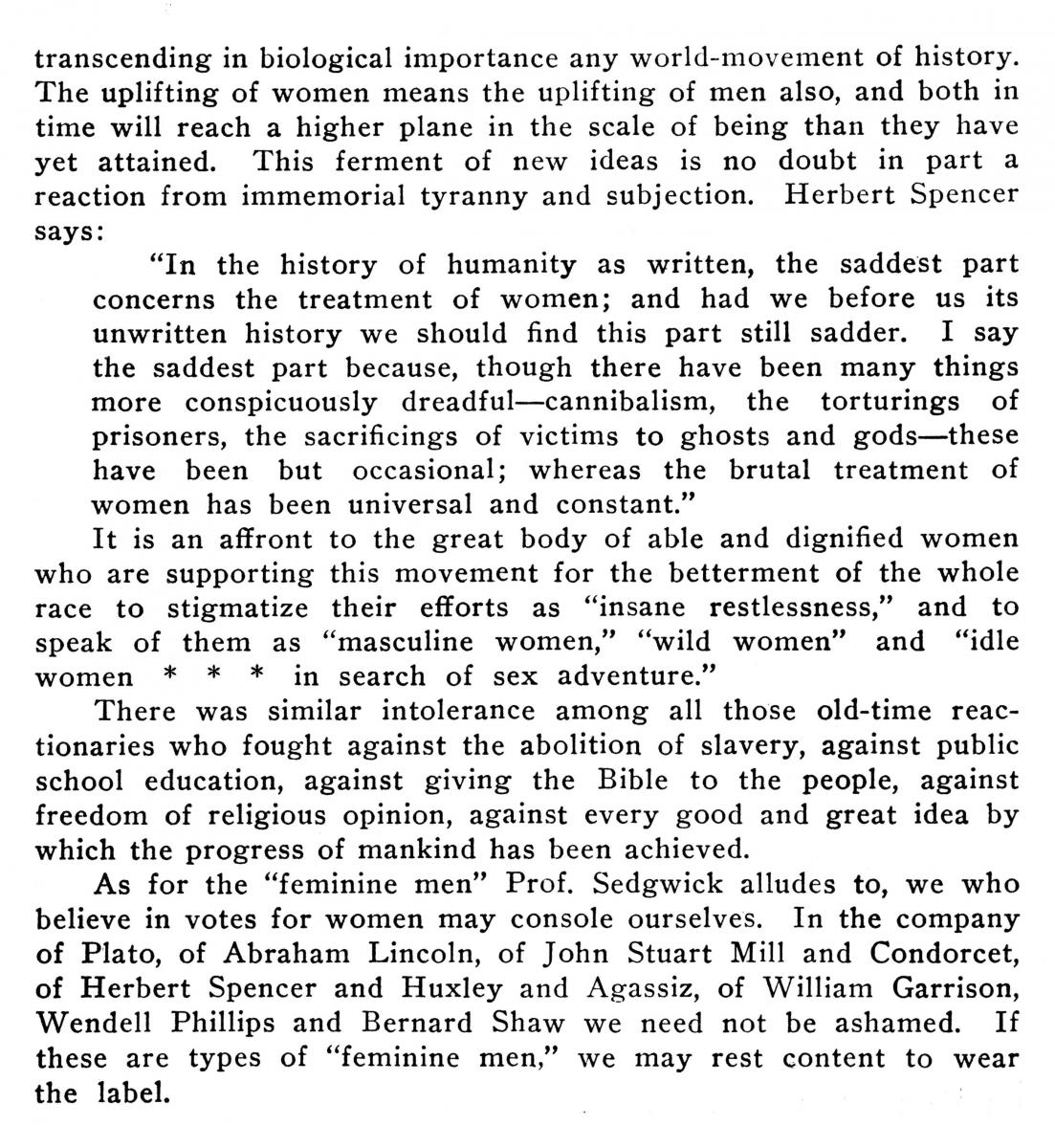
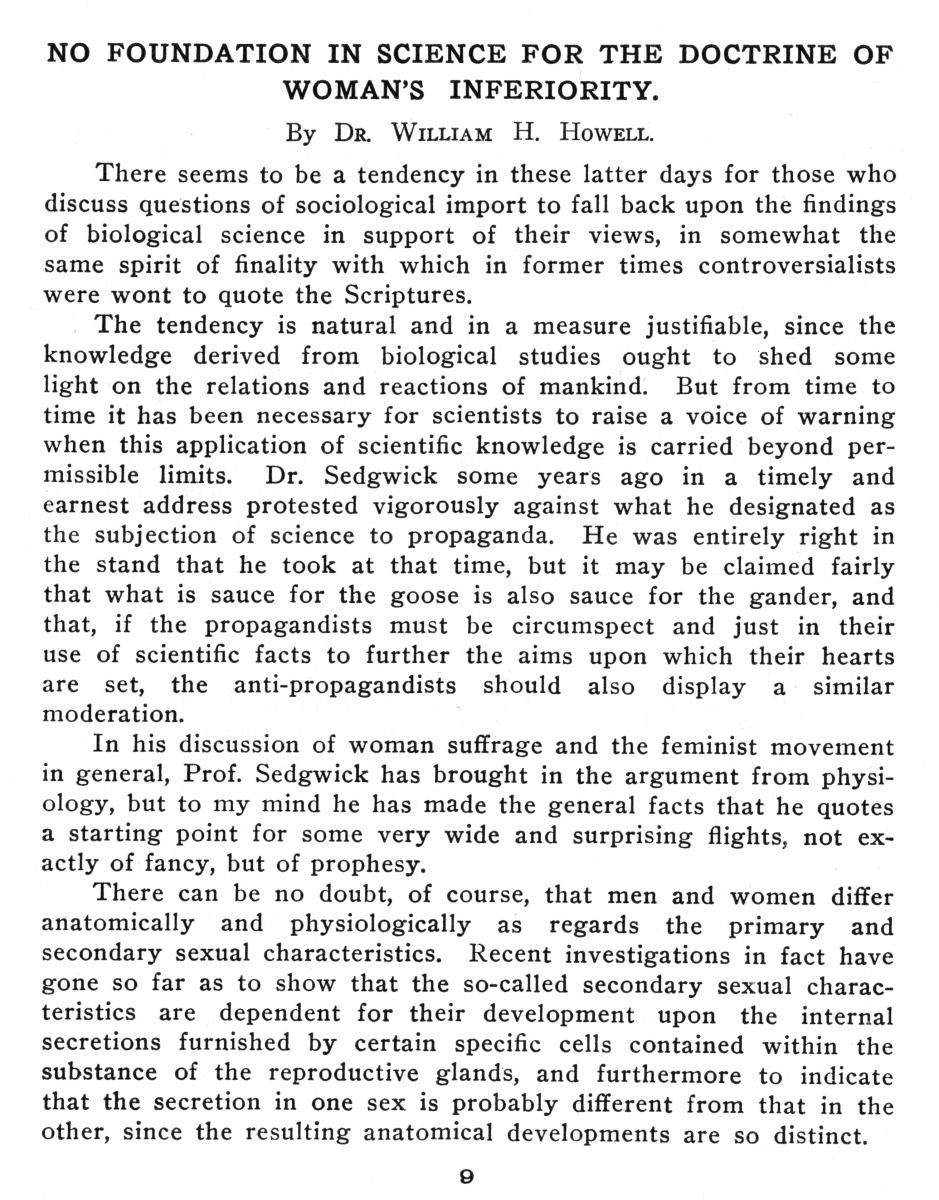
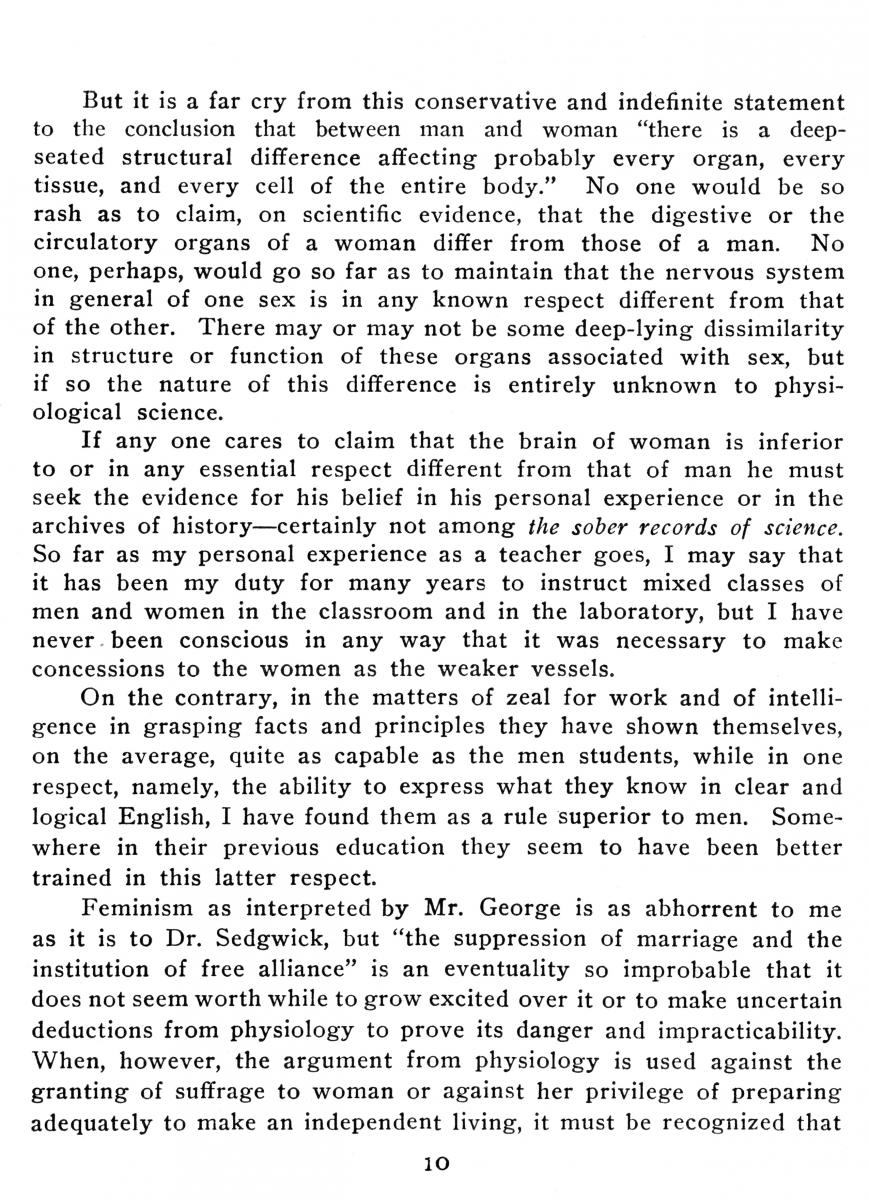
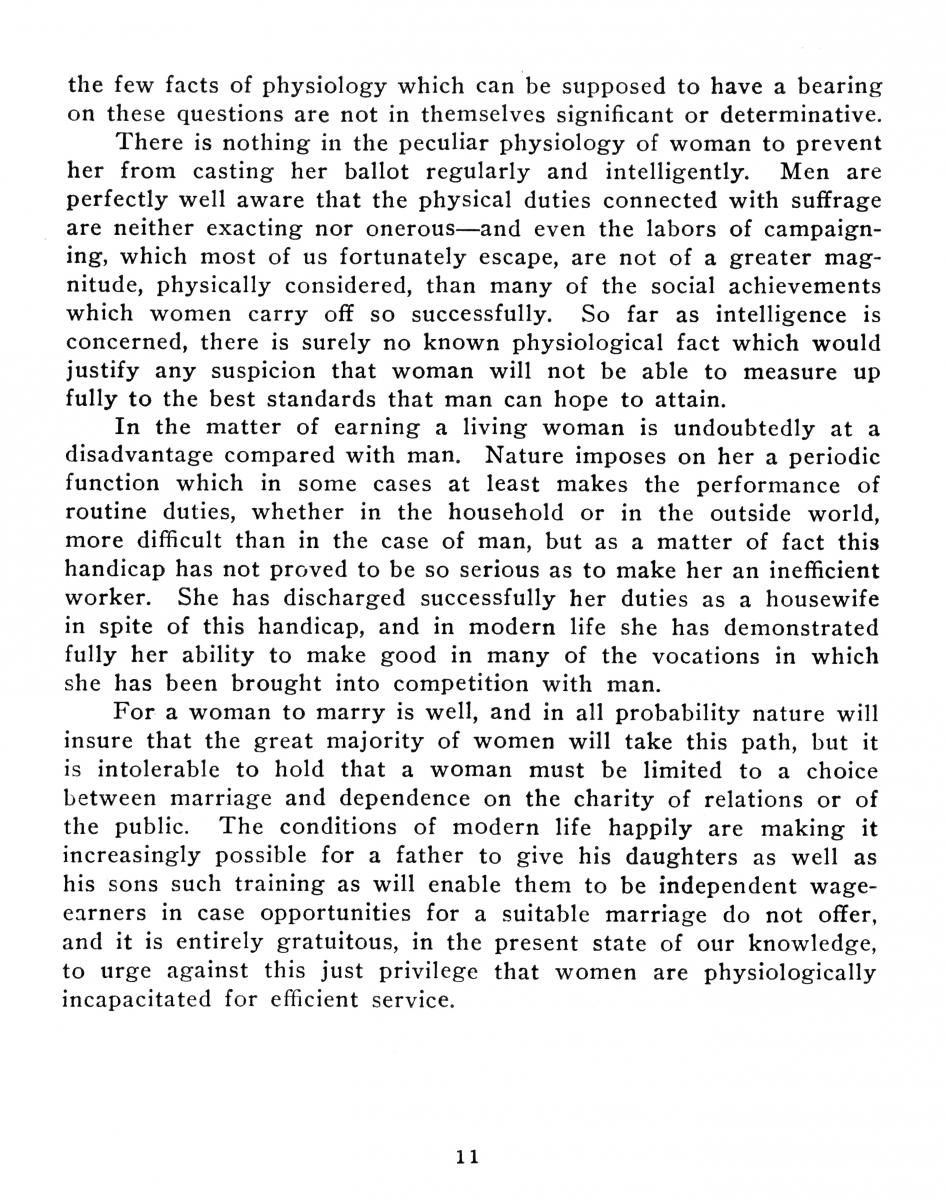
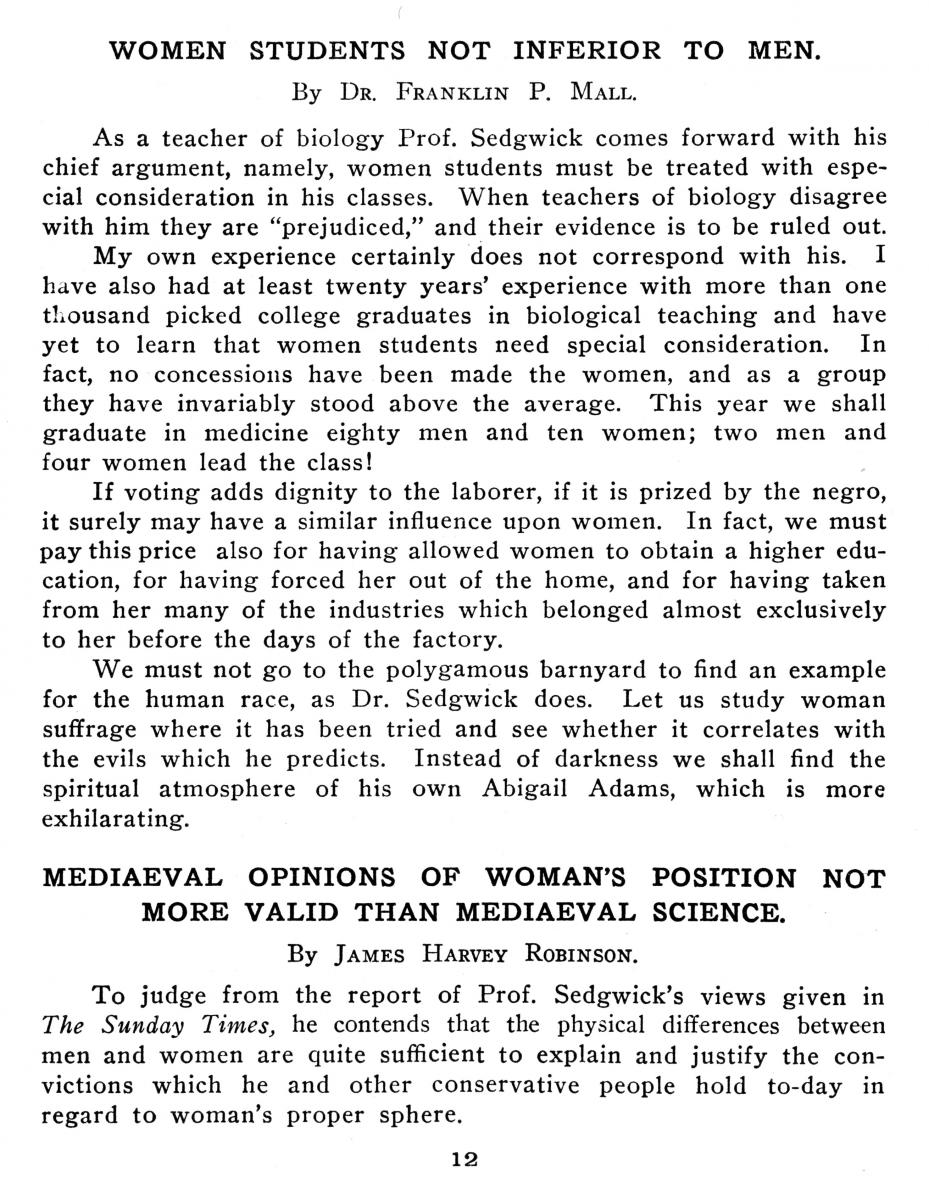
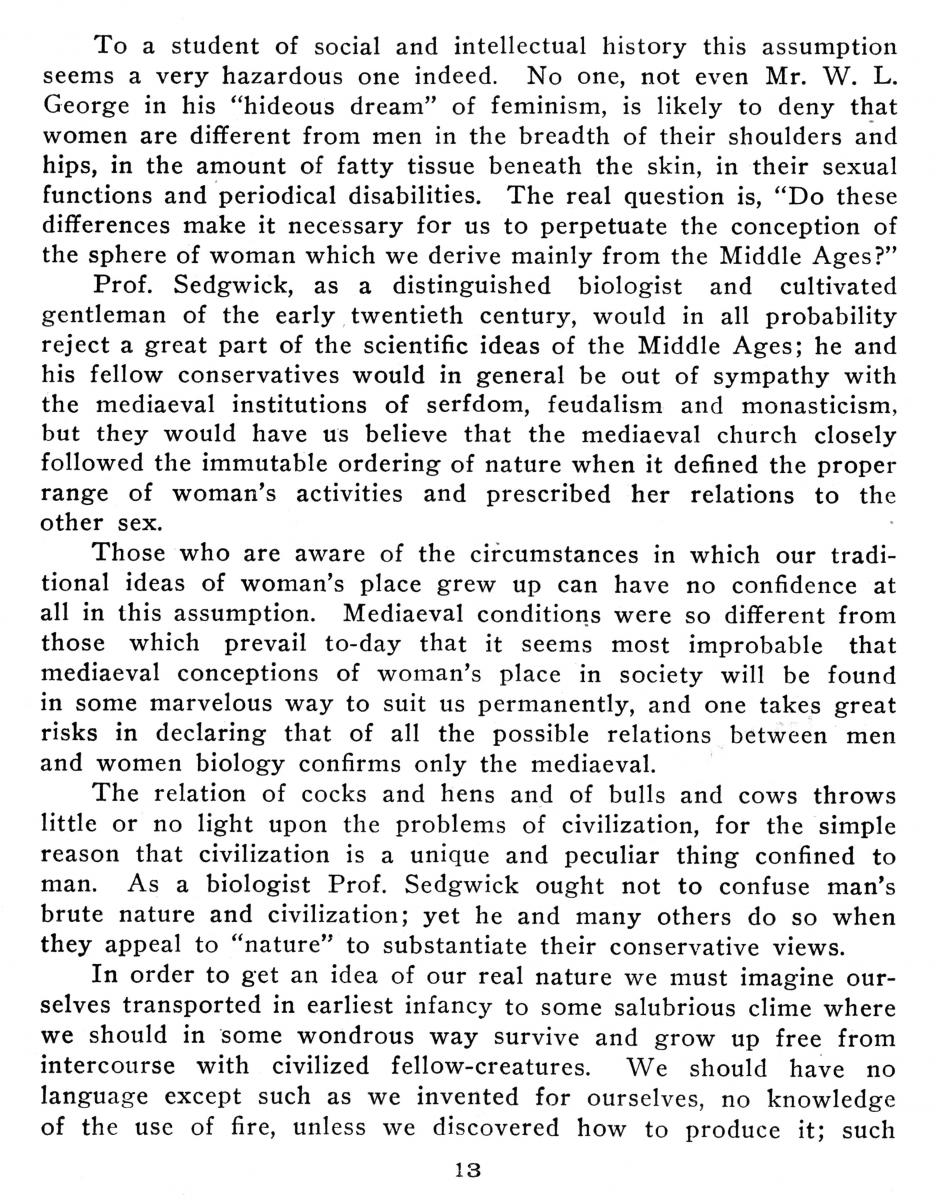
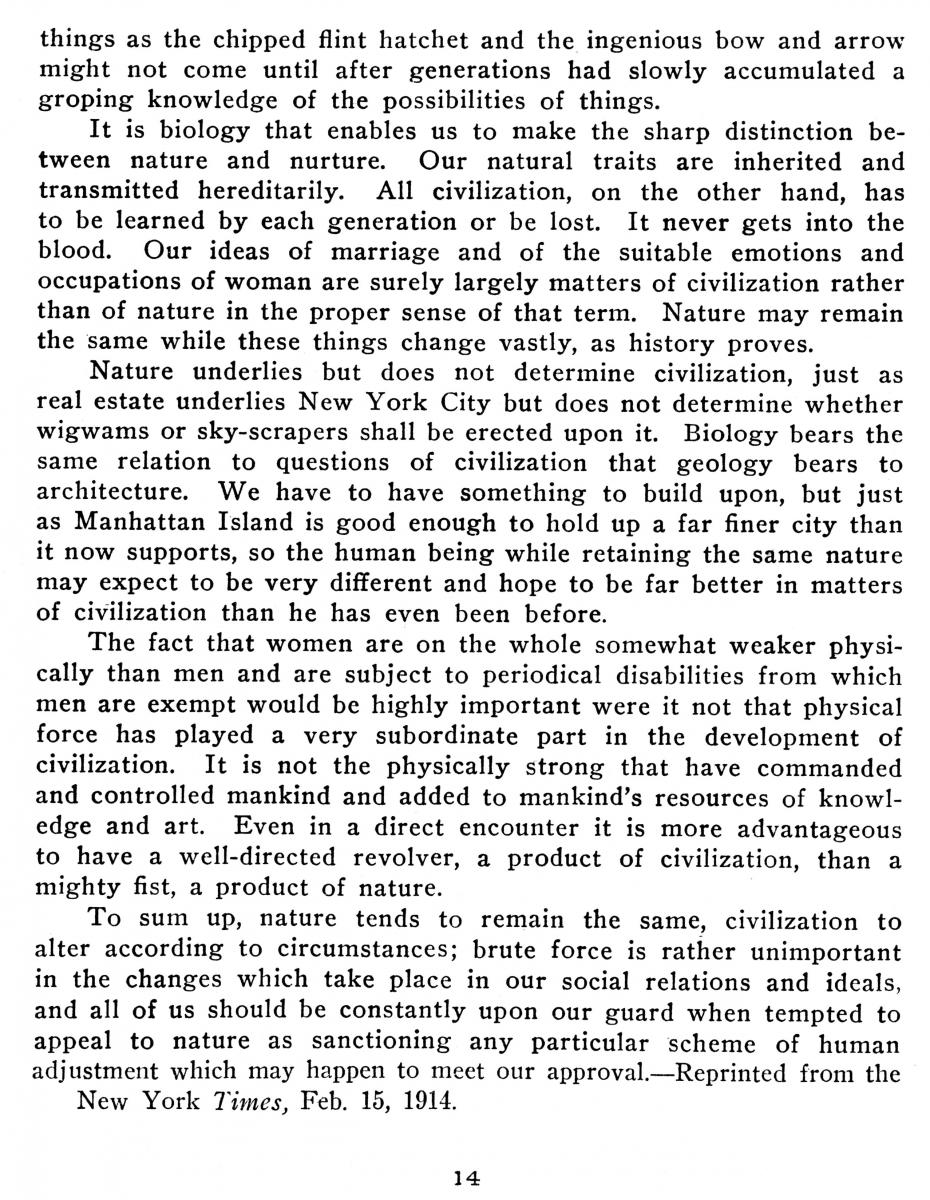
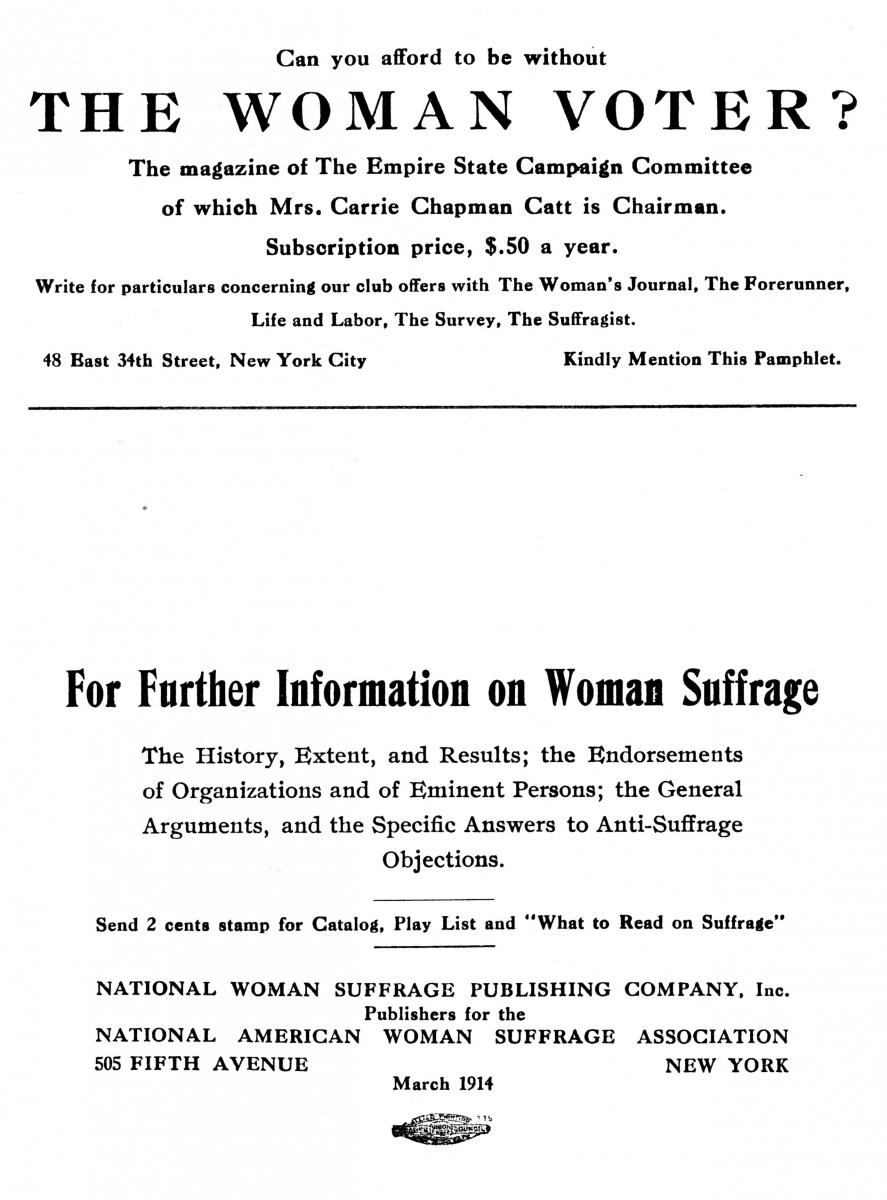
THE BIOLOGICAL ARGUMENT
AGAINST WOMAN SUFFRAGE
By
Dr. SIMON FLEXNER
Director of the Laboratories,
Rockefeller Institute.
Dr. FREDERICK PETERSON
Professor, Department of Nerv-
ous and Mental Diseases, Co-
lumbia University.
Dr. WILLIAM H. HOWELL
Professor of Physiology, John
Hopkins University and Medical
School.
Dr. FRANKLIN P. MALL
Professor of Anatomy, John
Hopkins University and Medical
School.
Prof. JAMES HARVEY ROBINSON
Professor of History, Columbia University.
ISSUED BY THE EMPIRE STATE CAMPAIGN COMMITTEE
Press Department, 303 Fifth Avenue
NATIONAL WOMAN SUFFRAGE PUBLISHING COMPANY, Inc.
Publishers for the
NATIONAL AMERICAN WOMAN SUFFRAGE ASSOCIATION
505 FIFTH AVENUE NEW YORK
March 1914
The Biological Argument Against
Woman Suffrage
From time to time arguments have been brought forward to show
that because of their physical constitution women are biologically unfitted
for the duties of citizenship. These arguments have been assembled es-
pecially by Professor William T. Sedgwick of Boston and given wide
publicity by him. That they do not appear sound or convincing to many
biologists of distinction or to all careful students of human history is
proven by the following letters originally published in the New York
Times of February 14th, 1914. The letter on Feminism by Mrs. Carrie
Chapman Catt, which appeared at the same time, has been issued in
separate form by the Empire State Campaign Committee and can be
bought of it.
ANATOMY NOT A TRUE GUIDE.
By Dr. Simon Flexner.
No one with any knowledge of anatomy and physiology would to-day
contend that men and women are precisely the same. While on this
point I agree with Prof. Sedgwick, I differ from him completely in his
main contention. I do not believe that there is physiological foundation
for the assertion that the functions of the brain, and thus the operations
of the intelligence, are in any way affected by the differences in anatomical
structure in the two sexes.
We all allow among both men and women for wide divergences of
individual traits, and while it is doubtless true that, so far as emotional
sensibility is concerned, women are more reactive than men, yet many
2
men are emotionally highly responsive, and there are by no means a small
number of men who are more emotional than many women. And yet, as
no one has undertaken to determine fitness for public responsibility among
men upon such a temperamental quality, it may justly be asked why the
test should be applied to women.
Like Prof. Sedgwick, I have had experience with teaching women
under as trying conditions as ordinarily arise in laboratories. The study
of medicine to-day makes a heavy demand on the fibre and endurance
both of men and women. I have seen failure and success achieved, but
the cleavage was not along sex lines. My observation is that women in
laboratories toil on day by day and month by month, and as a rule have
themselves under a degree of physical and emotional control that makes
any difference in their daily physical state imperceptible.
It seems to me exceedingly questionable to base a decision of suit-
ability for the offices of citizenship upon anatomical and physiological
criteria which probably have at best only remote and indirect bearing
upon the problem.
Modern society has seen a revolution in woman’s state within half
a century, and not only has survived the change, but has proceeded to
exploit women still further in industry and the higher functions of the
State. Indeed, New York at the moment possesses notable examples of
efficient women devoting their able talents to the public welfare. Doubt-
less, therefore, when political enfranchisement comes, it also will be
survived; and under the political conditions then created the State will
develop the new asset, not only for the women who will be directly
benefited, but to the advantage of society as a whole.
3
NORMAL WOMEN NOT NEUROTIC.
By Dr. Frederick Peterson.
Prof. Sedgwick’s interview in The Times on the subject of feminism
and woman suffrage is not as calmly judicial as one would expect from
a man of science.
I had supposed that to a biologist “equal rights and equal opportuni-
ties” for every human being would be a truism, founded on his large
dealings with natural biological phenomena and upon the sense of
abstract justice which should develop in such an observer. Prof. Sedg-
wick makes too much of the differences between men and women. The
fundamental differences are too apparent to need discussion, but I should
think a biologist could hardly overlook the essential points in which men
and women are exactly alike—alike in their human nature, each alike
possessing individuality, and alike in potential ability to perform most
kinds of the world’s work. In these respects individual capacity varies
in both sexes, but the differences in capacity between men and women
are no greater than between various groups or classes of men alone.
Most scientists freely admit this.
In a letter to The London Times Thomas Huxley remarked:
“Without seeing any reason to believe that women are, on the
average, so strong physically, intellectually or morally as men, I can-
not shut my eyes to the obvious fact that many women are much
better endowed in all these respects than many men, and I am at
a loss to understand on what grounds of justice or public policy a
career which is open to the weakest and most foolish of the male
sex should be forcibly closed to women of vigor and capacity. We
hear a great deal about the physical disabilities of women. Some of
these alleged impediments no doubt are really inherent in their or-
ganization, but nine-tenths of them are artificial—the product of
their mode of life.”
Nevertheless, while women now deny many of the alleged differences,
it is precisely because of the true differences that they are demanding
a voice in government. Wendell Phillips said long ago:
“Either a woman is like a man and entitled to all the rights and
privileges of a man or she is unlike him and therefore no man has
a right to speak for her.”
4
Prof. Sedgwick’s biological citations of the hen and the cow seem
somewhat fragmentary. He says that “the hen and the rooster,” the
“cow and the bull” have “both had the same environment and opportunity,”
and adds that the same is true of the dog. He seems to have overlooked
the most important factor in the environment of these domestic animals,
which is the master mind of man for countless generations directing and
specializing to his own uses the functions of each—one to be exclusively
a milk-producer,, another to lay eggs all the year round. How powerful
the influence of man in the environment may be is shown in the case
of the dog, molded into innumerable varieties of form, size, qualities, and
attributes in answer to the will of man.
But granting the difference between the cock and the hen, the bull
and the cow, it appears to be all in favor of the hen and the cow. Which
are the more industrious and useful members of barnyard society? The
males strut and fight and scratch or paw the ground, while the females do
all the work.
Let us take a few more instances—what the horse does, the mare
can do. Perhaps, indeed, it was she who first set us an example of
“team work.” Among cats, for which man has never found any economic
use, the differences of sex are scarcely perceptible.
Among wild animals, which Prof. Sedgwick neglects to mention, the
female is supreme in all the serious and essential affairs of life. It is the
female elephant who leads the herd, the lioness who kills, and the tigress
who feeds, defends and rears her young without any assistance whatever
from the tiger. In the insect world the female is always the sovereign
power.
Prof. Leslie Ward states that in the order of biological evolution the
male was primarily and normally an inconspicuous and insignificant after-
thought of nature. It is certain that all through the animal world
up to man the female of every species feeds and defends herself and
honorably earns her own living. Only the human female has ever
been dependent on her mate for her living. It is also certain that
this was not the case among primitive races, but that it gradually
came about. There have been periods in human society where mother-
right was supreme and races still exist where it can be observed.
One assertion made by Prof. Sedgwick is that “in spite of the
open door * * * so few women become doctors,” and “it is
5
significant that there are almost no women surgeons.” In the
first place, the door is not open in the sense of being wide open.
It is open enough to squeeze through. There is scarcely a university
in America whose medical department admits women students, and
it is as yet impossible in this country for any female student to get
hospital training equal in quality to that afforded to male students.
In the second place, this crack in the door has been open for
just about one generation. The first woman in America to graduate
in medicine, Dr. Elizabeth Blackwell, died less than five years ago.
Yet it is surprising how many women doctors there are now all
over the United States, and in every large city there are among them
many good surgeons. The United States Census for 1900 gives the
number of women physicians and surgeons as 7,387.
For a number of years I was a teacher in the Women’s Medical
College of the New York Infirmary. Judging from that experience
with women students, I believe there is no physical, psychical or
sexual reason why, in time, when all the barriers against them have
broken down, there should not arise some woman surgeon equal
or even superior to any man we have now.
Prof. Sedgwick quotes Sir Almroth E. Wright in reference to
nervous and mental disorders which sometimes appear with preg-
nancy and the climacteric. Sir Almroth’s assertions are made as
if such disorders were the usual thing, whereas in fact they are
unusual. These physiological commotions in the body sometimes
do evoke symptoms due to an already underlying neurotic constitu-
tion, or to actual diseases present at the time, such as sepsis or
auto-intoxication, anaemia and the like. But the normal woman
in my experience is never made abnormal by these normal physi-
ological conditions. In cases of pregnancy nervous symptoms are
not always limited to the female member of the family.
The destruction of the home! Whenever a new idea gets afoot
in the world in regard to women somebody is sure to prophesy the
destruction of the home. Of course, it used to be doubted whether
women had souls. It was thought probable that only men were
endowed with immortal souls. And when some wicked agitators
began spreading the idea among women that they, too, were creatures
of soul as well as sense the destruction of the home was promptly
6
to follow any such dangerous propaganda. It was the same when
they learned to read and write, to manage their own property, when
they asked for college education. The first women to study medicine
in this country suffered a sort of social crucifixion.
Women suffragists do not propose to destroy the home. On the
contrary, they believe that the home is the sacred cornerstone of
society and government. They want to vote in order to help to
make better homes possible. What are the homes to which it is
feared woman suffrage will put an end? The hideous tenements
of the congested districts of our cities? The homes of widows who
must go out all day at hard labor for a scanty wage, leaving their
children to what unnameable perils? Or the homes of the unem-
ployed, to which the breadwinner returns day after day sick with
discouragement—guilty of no fault save that no man has hired him?
We have been told recently that there are 325,000 men in this city
out of work, and that out of these not more than 20,000 can be called
outcasts. The rest are men with wives and families to support.
Women suffragists
Want a world with homes for all the race,
For every babe that’s born a happy place
And equal opportunity to be
All that befits a high humanity.
Surely the woman who bears and rears the child carries a greater
responsibility in the home than the man. Surely she should have
an equal voice with his in all matters which concern its safety and
protection. And this means practically all the laws—for all laws,
whether of public health, pure food, sanitation, education, trans-
portation, liquor traffic, taxation, crimes, national defense or what
not, come back at last to the home and centre there.
Woman has a deeper conscience, a greater sense of responsibility
than man in all that pertains to homekeeping and the rearing of
children. In short, to give women the ballot will be to fortify the
home and strengthen it against the disintegrating influences of
modern life.
It is quite true that there is a ferment of new interests and
ideas among women in all parts of the civilized world to-day, perhaps
7
transcending in biological importance any world-movement of history.
The uplifting of women means the uplifting of men also, and both in
time will reach a higher plane in the scale of being than they have
yet attained. This ferment of new ideas is no doubt in part a
reaction from immemorial tyranny and subjection. Herbert Spencer
says:
“In the history of humanity as written, the saddest part
concerns the treatment of women; and had we before us its
unwritten history we should find this part still sadder. I say
the saddest part because, though there have been many things
more conspicuously dreadful—cannibalism, the torturings of
prisoners, the sacrificings of victims to ghosts and gods—these
have been but occasional; whereas the brutal treatment of
women has been universal and constant.”
It is an affront to the great body of able and dignified women
who are supporting this movement for the betterment of the whole
race to stigmatize their efforts as “insane restlessness,” and to
speak of them as “masculine women,” “wild women” and “idle
women * * * in search of sex adventure.”
There was similar intolerance among all those old-time reac-
tionaries who fought against the abolition of slavery, against public
school education, against giving the Bible to the people, against
freedom of religious opinion, against every good and great idea by
which the progress of mankind has been achieved.
As for the “feminine men” Prof. Sedgwick alludes to, we who
believe in votes for women may console ourselves. In the company
of Plato, of Abraham Lincoln, of John Stuart Mill and Condorcet,
of Herbert Spencer and Huxley and Agassiz, of William Garrison,
Wendell Phillips and Bernard Shaw we need not be ashamed. If
these are types of “feminine men,” we may rest content to wear
the label.
8
NO FOUNDATION IN SCIENCE FOR THE DOCTRINE OF
WOMAN’S INFERIORITY.
By Dr. William H. Howell.
There seems to be a tendency in these latter days for those who
discuss questions of sociological import to fall back upon the findings
of biological science in support of their views, in somewhat the
same spirit of finality with which in former times controversialists
were wont to quote the Scriptures.
The tendency is natural and in a measure justifiable, since the
knowledge derived from biological studies ought to shed some
light on the relations and reactions of mankind. But from time to
time it has been necessary for scientists to raise a voice of warning
when this application of scientific knowledge is carried beyond per-
missible limits. Dr. Sedgwick some years ago in a timely and
earnest address protested vigorously against what he designated as
the subjection of science to propaganda. He was entirely right in
the stand that he took at that time, but it may be claimed fairly
that what is sauce for the goose is also sauce for the gander, and
that, if the propagandists must be circumspect and just in their
use of scientific facts to further the aims upon which their hearts
are set, the anti-propagandists should also display a similar
moderation.
In his discussion of woman suffrage and the feminist movement
in general, Prof. Sedgwick has brought in the argument from physi-
ology, but to my mind he has made the general facts that he quotes
a starting point for some very wide and surprising flights, not ex-
actly of fancy, but of prophesy.
There can be no doubt, of course, that men and women differ
anatomically and physiologically as regards the primary and
secondary sexual characteristics. Recent investigations in fact have
gone so far as to show that the so-called secondary sexual charac-
teristics are dependent for their development upon the internal
secretions furnished by certain specific cells contained within the
substance of the reproductive glands, and furthermore to indicate
that the secretion in one sex is probably different from that in the
other, since the resulting anatomical developments are so distinct.
9
But it is a far cry from this conservative and indefinite statement
to the conclusion that between man and woman “there is a deep-
seated structural difference affecting probably every organ, every
tissue, and every cell of the entire body.,, No one would be so
rash as to claim, on scientific evidence, that the digestive or the
circulatory organs of a woman differ from those of a man. No
one, perhaps, would go so far as to maintain that the nervous system
in general of one sex is in any known respect different from that
of the other. There may or may not be some deep-lying dissimilarity
in structure or function of these organs associated with sex, but
if so the nature of this difference is entirely unknown to physi-
ological science.
If any one cares to claim that the brain of woman is inferior
to or in any essential respect different from that of man he must
seek the evidence for his belief in his personal experience or in the
archives of history—certainly not among the sober records of science.
So far as my personal experience as a teacher goes, I may say that
it has been my duty for many years to instruct mixed classes of
men and women in the classroom and in the laboratory, but I have
never been conscious in any way that it was necessary to make
concessions to the women as the weaker vessels.
On the contrary, in the matters of zeal for work and of intelli-
gence in grasping facts and principles they have shown themselves,
on the average, quite as capable as the men students, while in one
respect, namely, the ability to express what they know in clear and
logical English, I have found them as a rule superior to men. Some-
where in their previous education they seem to have been better
trained in this latter respect.
Feminism as interpreted by Mr. George is as abhorrent to me
as it is to Dr. Sedgwick, but “the suppression of marriage and the
institution of free alliance” is an eventuality so improbable that it
does not seem worth while to grow excited over it or to make uncertain
deductions from physiology to prove its danger and impracticability.
When, however, the argument from physiology is used against the
granting of suffrage to woman or against her privilege of preparing
adequately to make an independent living, it must be recognized that
lO
the few facts of physiology which can be supposed to have a bearing
on these questions are not in themselves significant or determinative.
There is nothing in the peculiar physiology of woman to prevent
her from casting her ballot regularly and intelligently. Men are
perfectly well aware that the physical duties connected with suffrage
are neither exacting nor onerous—and even the labors of campaign-
ing, which most of us fortunately escape, are not of a greater mag-
nitude, physically considered, than many of the social achievements
which women carry off so successfully. So far as intelligence is
concerned, there is surely no known physiological fact which would
justify any suspicion that woman will not be able to measure up
fully to the best standards that man can hope to attain.
In the matter of earning a living woman is undoubtedly at a
disadvantage compared with man. Nature imposes on her a periodic
function which in some cases at least makes the performance of
routine duties, whether in the household or in the outside world,
more difficult than in the case of man, but as a matter of fact this
handicap has not proved to be so serious as to make her an inefficient
worker. She has discharged successfully her duties as a housewife
in spite of this handicap, and in modern life she has demonstrated
fully her ability to make good in many of the vocations in which
she has been brought into competition with man.
For a woman to marry is well, and in all probability nature will
insure that the great majority of women will take this path, but it
is intolerable to hold that a woman must be limited to a choice
between marriage and dependence on the charity of relations or of
the public. The conditions of modern life happily are making it
increasingly possible for a father to give his daughters as well as
his sons such training as will enable them to be independent wage-
earners in case opportunities for a suitable marriage do not offer,
and it is entirely gratuitous, in the present state of our knowledge,
to urge against this just privilege that women are physiologically
incapacitated for efficient service.
11
WOMEN STUDENTS NOT INFERIOR TO MEN.
By Dr. Franklin P. Mall.
As a teacher of biology Prof. Sedgwick comes forward with his
chief argument, namely, women students must be treated with espe-
cial consideration in his classes. When teachers of biology disagree
with him they are “prejudiced,” and their evidence is to be ruled out.
My own experience certainly does not correspond with his. I
have also had at least twenty years' experience with more than one
thousand picked college graduates in biological teaching and have
yet to learn that women students need special consideration. In
fact, no concessions have been made the women, and as a group
they have invariably stood above the average. This year we shall
graduate in medicine eighty men and ten women; two men and
four women lead the class!
If voting adds dignity to the laborer, if it is prized by the negro,
it surely may have a similar influence upon women. In fact, we must
pay this price also for having allowed women to obtain a higher edu-
cation, for having forced her out of the home, and for having taken
from her many of the industries which belonged almost exclusively
to her before the days of the factory.
We must not go to the polygamous barnyard to find an example
for the human race, as Dr. Sedgwick does. Let us study woman
suffrage where it has been tried and see whether it correlates with
the evils which he predicts. Instead of darkness we shall find the
spiritual atmosphere of his own Abigail Adams, which is more
exhilarating.
MEDIAEVAL OPINIONS OF WOMAN'S POSITION NOT
MORE VALID THAN MEDIAEVAL SCIENCE.
By James Harvey Robinson.
To judge from the report of Prof. Sedgwick's views given in
The Sunday Times, he contends that the physical differences between
men and women are quite sufficient to explain and justify the con-
victions which he and other conservative people hold to-day in
regard to woman’s proper sphere.
12
To a student of social and intellectual history this assumption
seems a very hazardous one indeed. No one, not even Mr. W. L.
George in his “hideous dream” of feminism, is likely to deny that
women are different from men in the breadth of their shoulders and
hips, in the amount of fatty tissue beneath the skin, in their sexual
functions and periodical disabilities. The real question is, “Do these
differences make it necessary for us to perpetuate the conception of
the sphere of woman which we derive mainly from the Middle Ages?”
Prof. Sedgwick, as a distinguished biologist and cultivated
gentleman of the early twentieth century, would in all probability
reject a great part of the scientific ideas of the Middle Ages; he and
his fellow conservatives would in general be out of sympathy with
the mediaeval institutions of serfdom, feudalism and monasticism,
but they would have us believe that the mediaeval church closely
followed the immutable ordering of nature when it defined the proper
range of woman's activities and prescribed her relations to the
other sex.
Those who are aware of the circumstances in which our tradi-
tional ideas of woman’s place grew up can have no confidence at
all in this assumption. Mediaeval conditions were so different from
those which prevail to-day that it seems most improbable that
mediaeval conceptions of woman’s place in society will be found
in some marvelous way to suit us permanently, and one takes great
risks in declaring that of all the possible relations between men
and women biology confirms only the mediaeval.
The relation of cocks and hens and of bulls and cows throws
little or no light upon the problems of civilization, for the simple
reason that civilization is a unique and peculiar thing confined to
man. As a biologist Prof. Sedgwick ought not to confuse man’s
brute nature and civilization; yet he and many others do so when
they appeal to “nature” to substantiate their conservative views.
In order to get an idea of our real nature we must imagine our-
selves transported in earliest infancy to some salubrious clime where
we should in some wondrous way survive and grow up free from
intercourse with civilized fellow-creatures. We should have no
language except such as we invented for ourselves, no knowledge
of the use of fire, unless we discovered how to produce it; such
13
things as the chipped flint hatchet and the ingenious bow and arrow
might not come until after generations had slowly accumulated a
groping knowledge of the possibilities of things.
It is biology that enables us to make the sharp distinction be-
tween nature and nurture. Our natural traits are inherited and
transmitted hereditarily. All civilization, on the other hand, has
to be learned by each generation or be lost. It never gets into the
blood. Our ideas of marriage and of the suitable emotions and
occupations of woman are surely largely matters of civilization rather
than of nature in the proper sense of that term. Nature may remain
the same while these things change vastly, as history proves.
Nature underlies but does not determine civilization, just as
real estate underlies New York City but does not determine whether
wigwams or sky-scrapers shall be erected upon it. Biology bears the
same relation to questions of civilization that geology bears to
architecture. We have to have something to build upon, but just
as Manhattan Island is good enough to hold up a far finer city than
it now supports, so the human being while retaining the same nature
may expect to be very different and hope to be far better in matters
of civilization than he has even been before.
The fact that women are on the whole somewhat weaker physi-
cally than men and are subject to periodical disabilities from which
men are exempt would be highly important were it not that physical
force has played a very subordinate part in the development of
civilization. It is not the physically strong that have commanded
and controlled mankind and added to mankind’s resources of knowl-
edge and art. Even in a direct encounter it is more advantageous
to have a well-directed revolver, a product of civilization, than a
mighty fist, a product of nature.
To sum up, nature tends to remain the same, civilization to
alter according to circumstances; brute force is rather unimportant
in the changes which take place in our social relations and ideals,
and all of us should be constantly upon our guard when tempted to
appeal to nature as sanctioning any particular scheme of human
adjustment which may happen to meet our approval.—Reprinted from the
New York Times, Feb. 15, 1914.
14
Gan you afford to be without
THE WOMAN VOTER?
The magazine of The Empire State Campaign Committee
of which Mrs. Carrie Chapman Catt is Chairman.
Subscription price, $.50 a year.
Write for particulars concerning our club offers with The Woman’s Journal, The Forerunner,
Life and Labor, The Survey, The Suffragist.
48 Bast 34th Street, New York City Kindly Mention This Pamphlet.
For Farther Information on Woman Suffrage
The History, Extent, and Results; the Endorsements
of Organizations and of Eminent Persons; the General
Arguments, and the Specific Answers to Anti-Suffrage
Objections.
Send 2 cents stamp for Catalog, Play List and “What to Read on Suffrage”
NATIONAL WOMAN SUFFRAGE PUBLISHING COMPANY, Inc.
Publishers for the
NATIONAL AMERICAN WOMAN SUFFRAGE ASSOCIATION
505 FIFTH AVENUE NEW YORK
March 1914
